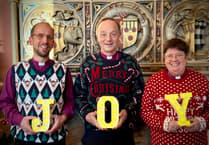IF you’ve ever thought carefully about the question of “who am I?” Then this might be for you.
Here in the Western world there are plenty of answers to that question. Pushing us to define ourselves by what we do, what we possess, or what others say about us.
Taken too far, we find ourselves chasing success, acquiring possessions, and seek validation on social media, letting likes and followers dictate our self-worth.
This pursuit, however, is a relentless rollercoaster.
When we succeed, we feel good. When we fail, we feel low.
If our identity is tied to our achievements, what happens when we are nearing the end of our lives and can no longer do the things we once did?
If our sense of self depends on the approval of others, how do we cope with criticism or rejection?
The Bible offers a radically different path.
St Paul, for instance presents a profound and liberating truth: through our faith, we have a new, unshakeable identity.
He writes, "Since, then, you have been raised with Christ, set your hearts on things above, not on earthly things below. For you died, and your life is now hidden with Christ in God" (Colossians 3:1-11).
I remember a couple of years ago someone very kindly gifted us a copy of Marie Kondo’s international best-seller, “Spark Joy”.
In it, she offers her take on the Japanese art of tidying.
The core idea is to pile up all your clothes and, holding each one, ask, “does this bring me joy?”.
If the answer is no, you thank it and get rid of it.
The book was so popular that charity shops across Europe had to close their donation points, overwhelmed with people’s tidying efforts.
Interestingly, St Paul, in his letter to the Colossians, is saying something similar.
He is telling us to take a good look at our actions and character and, if they don't align with our new identity in Christ, to get rid of them.
He lists examples like falsehood, anger, and greed.
Paul is speaking about the reality of our lives right now.
In baptism, we symbolically die to our old selves and are raised with Christ to a new life.
This means our identity (and our future as Christians) is no longer defined by our performance, reputation, or possessions.
It is defined by what Christ has done for us.
We are, as Paul explains, raised with Christ, hidden with Christ in God (a message of security not secrecy), and clothed with Christ.
This week, let’s reflect on this profound truth.
Our spiritual task is to claim this identity and live a life that reflects it. In this truth, we find a freedom the world can never offer.
Rev Jeremy Putnam, Team Vicar, North Creedy East Mission Community, and Mission Enabler for the Diocese of Exeter.





Comments
This article has no comments yet. Be the first to leave a comment.